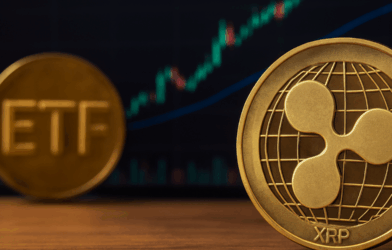The intersection between artificial intelligence and cryptocurrency mining just gained another major player. Bitcoin mining firm TeraWulf has announced plans to raise approximately $3 billion to expand its data center operations — a bold move supported by none other than Google, signaling a new phase in the convergence of crypto infrastructure and AI-driven computing.
A Mega-Deal in Motion
TeraWulf’s upcoming financing round, reportedly coordinated by leading investment banks, is expected to include a combination of high-yield debt and structured instruments. The company plans to use the funds to build large-scale data centers capable of supporting both Bitcoin mining and high-performance computing (HPC) workloads, particularly those demanded by artificial intelligence applications.
A key part of the deal involves Google’s backing, which could extend up to $1.4 billion of the proposed financing. This backing significantly enhances the project’s credibility and may allow TeraWulf to secure better terms than a typical high-risk borrower. Overall, Google’s total exposure and commitment to the partnership, including equity positions and related guarantees, is estimated to exceed $3 billion — a substantial show of confidence in the company’s shift from pure mining toward digital infrastructure.
The Fluidstack Partnership and Strategic Shift
This fundraising effort follows TeraWulf’s 10-year colocation lease agreement with Fluidstack, an AI-infrastructure firm that specializes in GPU-based cloud computing. The deal, valued at around $3.7 billion in total contract revenue, marks one of the largest collaborations between a crypto-native company and an AI compute provider.
The partnership allows Fluidstack to deploy its AI workloads in TeraWulf’s existing and upcoming facilities, while Google acts as a guarantor for part of the agreement. This structure minimizes counterparty risk and strengthens TeraWulf’s credit profile, providing a bridge between traditional capital markets and the emerging digital infrastructure economy.
Market Reaction and Industry Context
Following the announcement, TeraWulf’s shares surged more than 12% intraday, reflecting investor optimism about its evolving business model. The company’s stock has already seen impressive growth this year — nearly doubling in value as investors anticipate higher profitability from AI-related ventures compared to conventional Bitcoin mining.
This move isn’t isolated. Competitors such as Cipher Mining have signed similar contracts with AI infrastructure firms, also backed by Google’s financial participation. The message is clear: Bitcoin miners with access to cheap energy, real estate, and cooling systems are uniquely positioned to repurpose their infrastructure for AI and data-intensive workloads.
Why the Shift Matters
The AI computing boom has created an unprecedented demand for data center space, GPUs, and power — all areas where Bitcoin miners already hold significant advantages. These firms operate energy-dense facilities, often near renewable or low-cost power sources, making them prime candidates to meet AI’s soaring infrastructure requirements.
By entering this sector, TeraWulf not only diversifies its revenue stream but also mitigates its dependence on volatile Bitcoin prices. The company’s strategic goal is to transform from a “crypto miner” into a “digital energy company”, balancing blockchain operations with high-margin hosting for enterprise clients.
Financial and Credit Dynamics
The planned $3 billion fundraising, however, won’t come without challenges. The company’s existing financial metrics already show substantial leverage. With a debt-to-equity ratio close to 3:1 and ongoing operational expenses in its mining segment, taking on more debt could increase financial pressure if expected revenues don’t materialize quickly.
Analysts suggest the new debt will likely carry a speculative-grade credit rating (somewhere between BB and CCC). Still, Google’s participation may elevate investor confidence and attract large institutional buyers, such as pension funds and high-yield bond investors.
The interest rate environment also plays a major role. With rates expected to remain elevated through 2025, the cost of borrowing for high-risk companies is significant. If TeraWulf successfully prices this deal, it would signal that capital markets are warming up to crypto-adjacent infrastructure once again.
Execution Risks Ahead
Despite the optimism, scaling hyperscale data centers involves enormous operational and execution risk. Building AI-optimized facilities requires sophisticated cooling systems, network configurations, and specialized management expertise — all of which differ from traditional Bitcoin mining operations.
Potential challenges include:
- Construction delays and cost overruns, especially in acquiring hardware amid global chip shortages.
- Energy regulation and compliance hurdles, as governments increasingly scrutinize high-consumption data centers.
- Market demand fluctuations, which could leave facilities underutilized if AI spending slows or if competition intensifies.
- Dependence on long-term clients such as Fluidstack, meaning any early termination or contract revision could impact projected revenue.
Strategic Outlook
TeraWulf’s pivot toward AI-powered data centers aligns with a broader industry trend: the convergence of Bitcoin mining and AI infrastructure. What began as a niche crypto operation is evolving into a new hybrid model that merges blockchain, cloud computing, and sustainable energy utilization.
The company’s focus on renewable energy sources — hydro, nuclear, and solar — also differentiates it from peers. With increasing pressure for environmental accountability, this positioning could attract ESG-oriented investors who were previously reluctant to back crypto miners.
If executed effectively, the expansion could transform TeraWulf into one of the largest digital compute providers in North America, serving both blockchain networks and AI-driven enterprises. Its new business model could deliver steady, contract-based revenue streams, in contrast to the cyclical nature of Bitcoin mining rewards.
What Investors Should Watch
- Final Financing Terms – The pricing, structure, and duration of the debt deal will reveal how confident credit markets are in TeraWulf’s hybrid business model.
- Credit Rating Outcome – A higher-than-expected rating could lower borrowing costs and signal market approval of Google’s backing.
- Execution Progress – Construction milestones and new client sign-ups will determine how quickly the company can monetize the expansion.
- Balance Sheet Health – Investors will be watching cash flow generation and debt-servicing capacity closely as the project unfolds.
- Partnership Evolution – Any deepening of Google’s equity or operational role could reshape market perceptions and valuations.
The Bigger Picture
The TeraWulf-Google alliance represents more than just a financing transaction — it’s a symbol of how crypto infrastructure is evolving. As AI, cloud computing, and blockchain begin to overlap, firms that can bridge these worlds will likely lead the next growth phase of digital infrastructure.
This $3 billion initiative marks a bold gamble: leveraging the volatile foundations of Bitcoin mining to power the steady, explosive growth of AI. If successful, TeraWulf could emerge as a pioneer in redefining what a “crypto miner” means in the age of intelligent computing — one that mines not only Bitcoin, but also the future of data itself.











